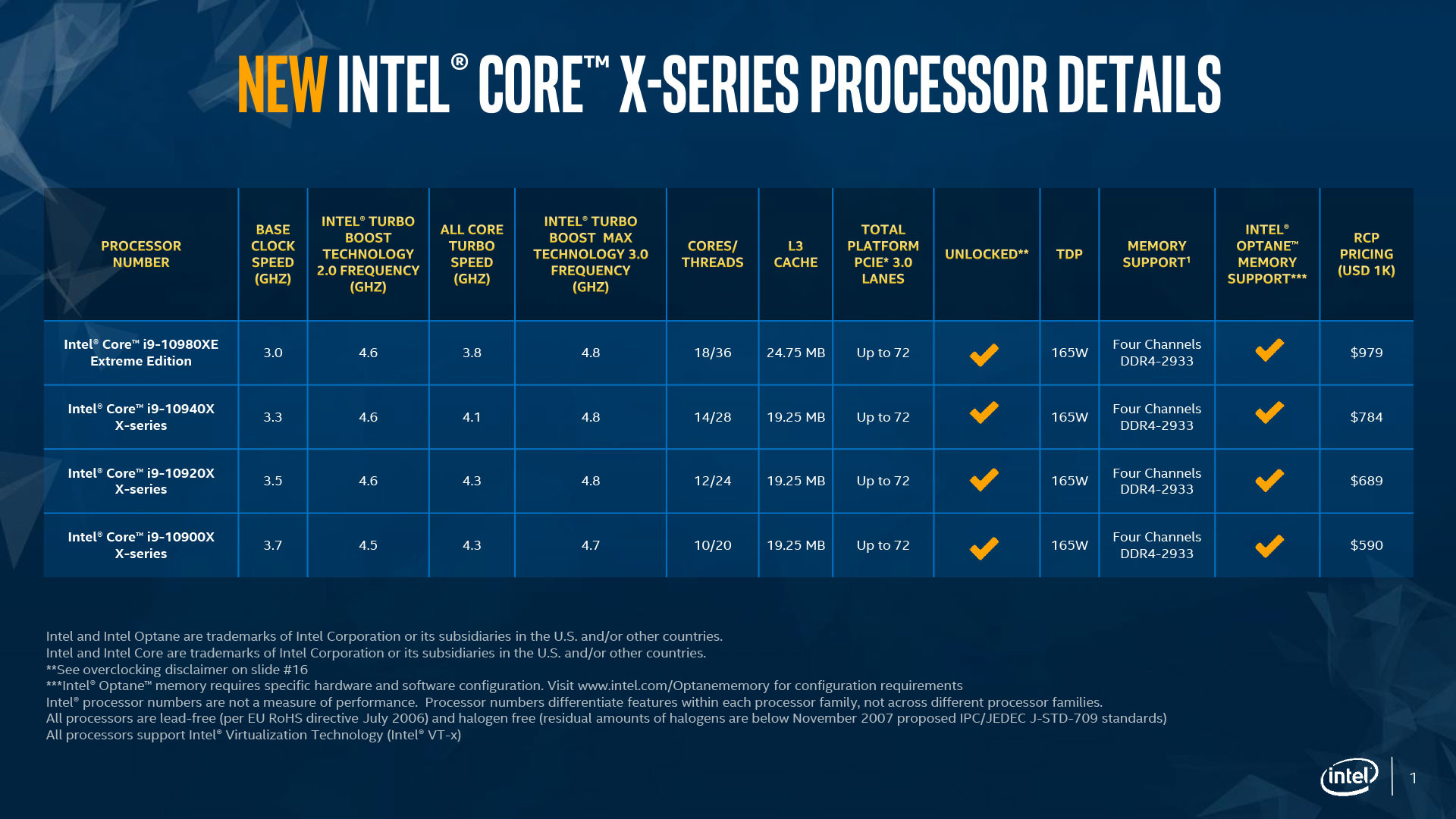- Joined
- Oct 9, 2007
- Messages
- 47,906 (7.37/day)
- Location
- Dublin, Ireland
| System Name | RBMK-1000 |
|---|---|
| Processor | AMD Ryzen 7 5700G |
| Motherboard | Gigabyte B550 AORUS Elite V2 |
| Cooling | DeepCool Gammax L240 V2 |
| Memory | 2x 16GB DDR4-3200 |
| Video Card(s) | Galax RTX 4070 Ti EX |
| Storage | Samsung 990 1TB |
| Display(s) | BenQ 1440p 60 Hz 27-inch |
| Case | Corsair Carbide 100R |
| Audio Device(s) | ASUS SupremeFX S1220A |
| Power Supply | Cooler Master MWE Gold 650W |
| Mouse | ASUS ROG Strix Impact |
| Keyboard | Gamdias Hermes E2 |
| Software | Windows 11 Pro |
One of the first reviews of Intel's new flagship HEDT processor, the Core i9-10980XE, just hit the web. Lab501.ro got their hands on a freshly minted i9-10980XE and put it through their test bench. Based on the "Cascade Lake-X" silicon, the i9-10980XE offers almost identical IPC to "Skylake-X," but succeeds the older generation with AI-accelerating DLBoost instruction-set, an improved multi-core boosting algorithm, higher clock speeds, and most importantly, a doubling in price-performance achieved by cutting the cores-per-Dollar metric by half, across the board.
Armed with 18 cores, the i9-10980XE is ahead of the 12-core Ryzen 9 3900X in rendering and simulation tests, although not by much (for a chip that has 50% more cores). This is probably attributed to the competing AMD chip being able to sustain higher all-core boost clock speeds. In tests that not only scale with cores, but are also hungry for memory bandwidth, such as 7-zip and Media, Intel extends its lead thanks to its quad-channel memory interface that's able to feed its cores with datasets faster.






As we move to gaming and gaming-related 3D benchmarks, we see the i9-10980XE only marginally ahead of the 3900X in the 3DMark Physics test. This lends credibility to the report where the unreleased 16-core 3950X was seen beating the i9-10980XE in this particular test. With gaming still being the forte of mainstream-desktop processors with lower core counts and higher clock-speeds, we see the likes of the i9-9900K racing ahead on account of significantly higher speeds while having sufficient muscle to handle games. Find more interesting results in the Lab501 review here.




View at TechPowerUp Main Site
Armed with 18 cores, the i9-10980XE is ahead of the 12-core Ryzen 9 3900X in rendering and simulation tests, although not by much (for a chip that has 50% more cores). This is probably attributed to the competing AMD chip being able to sustain higher all-core boost clock speeds. In tests that not only scale with cores, but are also hungry for memory bandwidth, such as 7-zip and Media, Intel extends its lead thanks to its quad-channel memory interface that's able to feed its cores with datasets faster.






As we move to gaming and gaming-related 3D benchmarks, we see the i9-10980XE only marginally ahead of the 3900X in the 3DMark Physics test. This lends credibility to the report where the unreleased 16-core 3950X was seen beating the i9-10980XE in this particular test. With gaming still being the forte of mainstream-desktop processors with lower core counts and higher clock-speeds, we see the likes of the i9-9900K racing ahead on account of significantly higher speeds while having sufficient muscle to handle games. Find more interesting results in the Lab501 review here.




View at TechPowerUp Main Site







